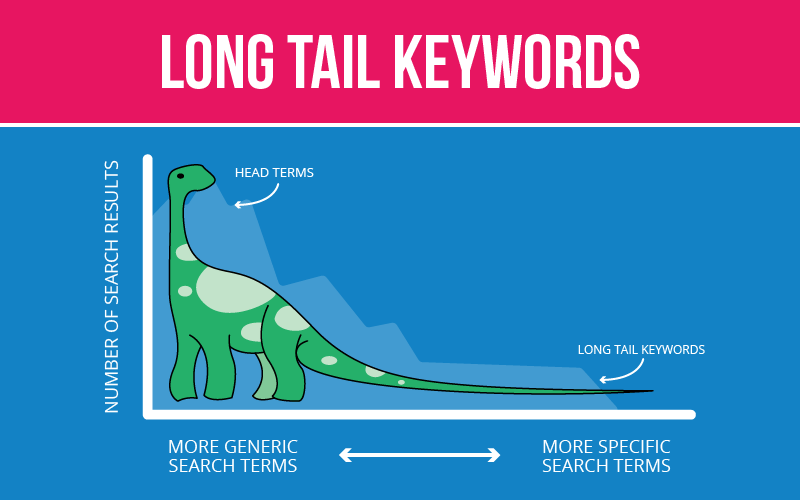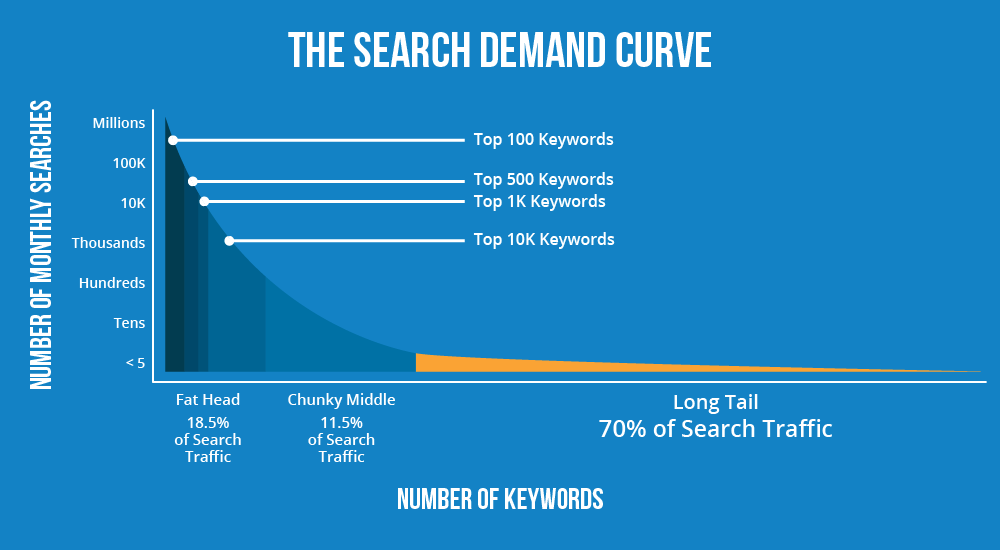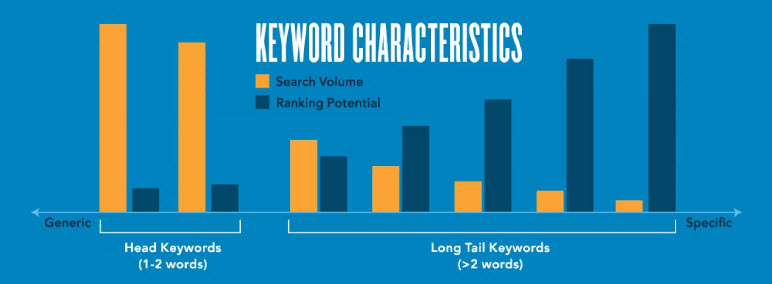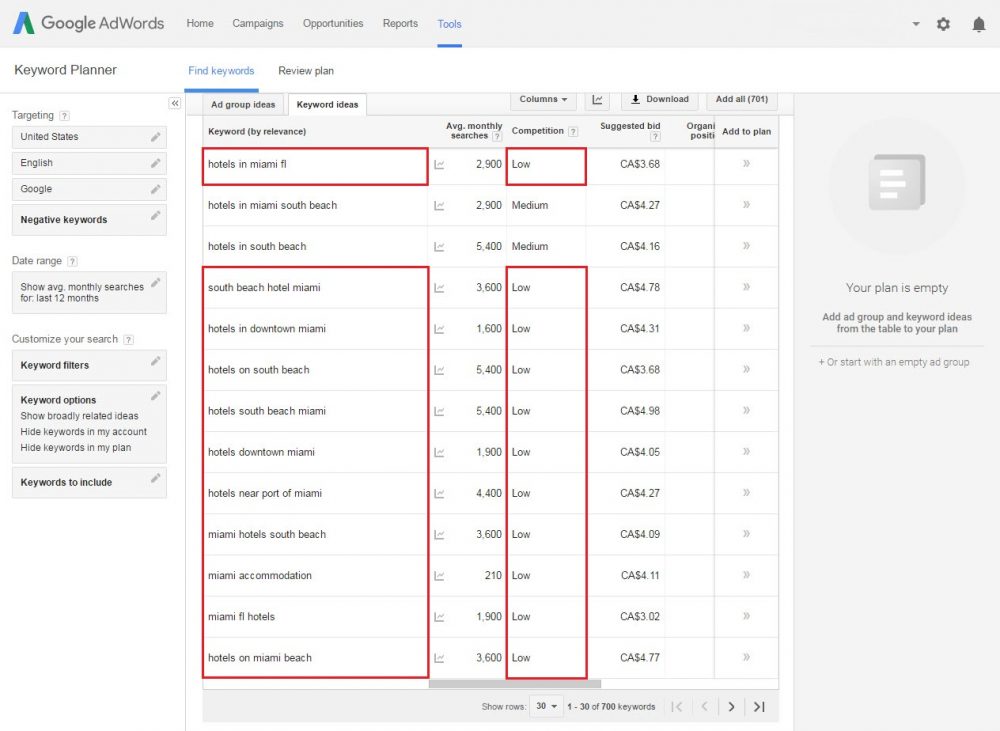What Are Long Tail Keywords & How Can They Drive Bookings?
The most cost-effective way to drive traffic to your hotel website is organically, so it’s no surprise that hotel marketers want to learn more on how to do this effectively. Driving overall traffic to your website is important, but driving quality traffic should also be a priority. By “quality traffic,” we mean visitors who are likely to book a hotel in your area in the near future.
But how do you find these people? Or, more accurately, how do they find you? By tweaking your SEO strategy to focus more on long tail keywords, you’ll be able to drive more quality website traffic that is more likely to convert.

What Are Long Tail Keywords?
Long tail keywords are search terms that consist of 3 or more words. They are more specific than commonly searched keywords like “hotels,” which are known as ‘head terms.’ Many hotels will try in vain to rank for head terms because they are searched more frequently. However, this also means they are more competitive. Long tail keywords, on the other hand, are less competitive and likely to drive more qualified traffic.
Here’s why: Head keywords tend to be informational in nature. Someone searching for “Miami Hotels” is likely in the research stage of the travel shopping journey. They are simply looking for what hotel options are available. Since these searches are largely research based, the visitors you receive from them aren’t likely to book, at least not right away.
Long tail keywords, on the other hand, are more targeted and transaction-based in nature. A long tail search for something like “kid-friendly Miami hotel near the zoo” indicates that the travel shopper has already identified their main hotel shopping criteria. They know the location and type of hotel they want to stay in, and are likely ready to book. A study by SEO & SaaS company, Conductor, found that long tail keywords convert 2.5 times better than head terms.
Why Focus On Long Tail Keywords?
Your SEO strategy should be focused on three main factors: volume, competition and relevance.
Volume
Many hotels choose to target head terms because they are often searched millions of times per month. However, head terms only make up a small percentage of the total number of searches. Long tail keywords are searched less frequently, but there are far more of them than head terms. As a result, over 70% of all searches are long tail, so there is ample opportunity for you to increase traffic volume by targeting long tail keywords.

Source: HitTail
Competition
You want to rank highly for the keywords you choose to target. The problem with head terms is there’s a lot of competition for the top spot on Google. Page 1 rankings are often dominated by big players like TripAdvisor or Expedia because of their high traffic volume and strong domain authority.
Long tail keywords can help you get found by targeting less competitive search terms. This will help you rank higher and capture a larger percentage of the people using this search term.

Source: HitTail
Relevance
The keywords you want to rank for need to be relevant to your property. If you rank for “child friendly beachfront Miami hotel” and your property is neither child friendly, nor on the beach, any traffic you receive will quickly bounce from your website. Driving more bookings on your website is only possible if you’re using relevant keywords to attract the right kind of visitors.
Which Long Tail Keywords Should You Target?
To know which long tail keywords to target, you must first have a clear understanding of what your hotel offers and what type of guests stay at your property. If you attract mainly business travelers, you want to focus on keywords that will resonate with them like: “Brisbane hotel with small meeting rooms,” or “Toronto hotel with onsite dry cleaning.” Ask your guests why they booked with you. Were there certain features about your property that they were looking for?
There are also plenty of online tools that can help you determine the right kind of long tail keywords to target. Google AdWords Keyword Planner lets you type in a general term like “Miami hotels” and provides you with hundreds of related keywords, along with the average monthly searches for each term. Scroll through the results and identify ones that relate to your hotel which have Low or Medium competition.
Other similar keyword planners include: ubersuggest, soovle and WordStream’s Keyword Tool.

Use Google AdWords Keyword Planner to identify the keywords that have 3+ words with low competition
How to Improve Your Long Tail Keyword Ranking
Once you have identified your long tail keywords, you need to produce content that is relevant to these search terms and will appeal to your ideal guest. The easiest way to do this is to add a blog to your website. You could also make this content a standalone webpage (e.g. “Things to Do” or “Special Offers”).
As you start to write your content, focus on these three guidelines:
Quality over Quantity
You don’t need to add new blog posts daily. With SEO, the old adage of quality over quantity rings true. Adopt a blog schedule that you can stick to. If you can produce multiple articles a week, that’s great. If you can only write two articles a month, that’s fine too, as long as the content is actually useful to your target audience. Just keep in mind, Google gives preference to longer content. You don’t always have to write thousands of words, but your content should never be less than 400 words.
Focus on Intent
When writing your content, focus on the intent behind the keywords rather than the specific keywords themselves. You obviously want to include the long tail keywords you’re trying to rank for, but if your content is useful, Google will reward you with even more traffic. Your content will not only rank for the specific keywords you’re targeting, but also for different variations of keywords with the same intent. This is one of the ways a long tail keyword strategy can add up to a lot of organic traffic.
Use Natural Language
Yes, you want to include the keywords you’re trying to rank for in your content, but it has to flow naturally. Google punishes content that uses “keyword stuffing.” If your content also doesn’t sound authentic or relevant, it won’t resonate with people. Before you post new content make sure you proofread it and ask yourself: Is the content engaging for my ideal guest? Does it read well? And does it answer the search query? If the answer is yes, you will start ranking for these long tail keywords.
To learn more about SEO and how to improve your search rankings download our Beginner’s Guide to SEO for Hotels.

